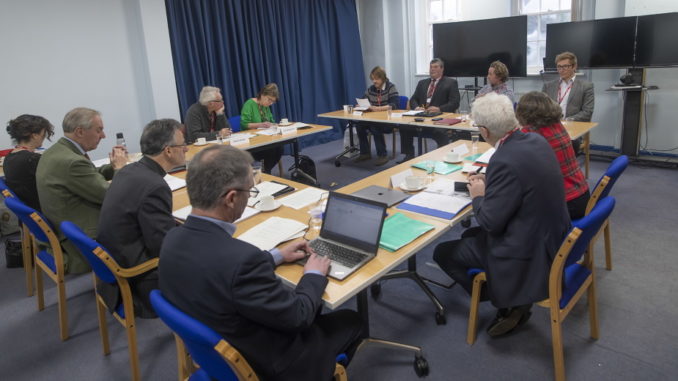
Tackling the issues of high employment but low wages linked to tourism and agricultural jobs is next up before North Yorkshire’s independent Rural Commission.
Following this month’s evidence session on food, farming and the environment, the eight commissioners will sit in January to hear from individuals, businesses and organisations on the issues and opportunities for a thriving economic future for the county.
Supported by the county council, the commission consists of experts in rural economics, policy, community led ventures, agriculture and the environment, business and media.
Chair of the Rural Commission, the Very Rev John Dobson DL, Dean of Ripon, said: “This month we heard a powerful mix of evidence and creative vision from farmers, rural organisations and agricultural businesses.
“All of the submissions received are being carefully examined.
“Next we hope to hear ideas and opportunities that will help us address the big issues of retaining and attracting young talent, business diversification, equality of opportunity, skills and training and a broad range of other subjects linked to jobs and the economy.
“I would like to thank everyone who has taken the time to send us evidence and to present to the commissioners and to encourage people to grasp this opportunity to help us to support our county’s most rural communities to grow and prosper in the future.”
North Yorkshire’s economy:
North Yorkshire has a relatively healthy and diverse economy which largely mirrors the national picture in terms of productivity and jobs. Employment levels exceed the national average at 81.9 per cent compared to 78.9 per cent in Great Britain. Average weekly pay is below that of Great Britain but above the regional average in Yorkshire and Humber. Productivity per head of population is below national averages but also above that of the region.
There are some sectorial differences between North Yorkshire and the UK and these reflect the rural nature of the county. Agriculture, manufacturing, accommodation and food are higher both in terms of productivity and employment value while information and communications and financial services are below average.
House prices are relatively high particularly when compared to wages with Ryedale and Harrogate being the least affordable districts in the North of England in which to buy a home.
Weekly earnings by place of residence (2018):
North Yorkshire £531
Yorkshire and Humberside £520
Great Britain £571
Across North Yorkshire there is substantial variation in average weekly incomes.
Manufacturing:
Food manufacturing in North Yorkshire accounts for about 50 per cent of the sector and in employment term, accounts for 21 per cent of employment in Ryedale and 16.7 per cent in Selby District. This sector accounts for 11 per cent of employment in North Yorkshire and 8 per cent nationally.
Tourism and the Visitor Economy:
In employment terms accommodation and food service activities are also extremely significant in North Yorkshire. In Scarborough Borough this sector accounts for 19 per cent of all jobs and 17.4 per cent in Richmondshire. That compares with 7.6 per cent nationally. Along with wholesale and retail these sectors account for over 25% of the county’s jobs in what are traditionally low paid occupations.
Numbers of self-employed individuals are higher in North Yorkshire, 15.1 per cent compared with 10.7 per cent nationally.
It is notable that by number of enterprises Agriculture, Food and Fishing is the largest sector in North Yorkshire by some margin with 6,410 enterprises compared with the next largest sector which is construction 3,425 enterprises. This probably reflects a large number of small scale producers with very low numbers of employees (2 on average) but it reinforces the view of a rural economy which includes a large number of micro enterprises working in agriculture, forestry and fishing related activities but with low margins of return or for relatively low wages.
Key areas for further investigation:
- Low wages versus high housing costs
- The future of farming in local and national supply chains
- Tourism and the low wage economy
- The role of technology, history and heritage
- The future of our market towns
- Distances workforce needs to travel to work
The commissioners will hear some evidence in person but will also be examining submissions made via email to RuralCommission@northyorks.gov.uk
Guidance on the best way to submit evidence and opinions, raise points of interest or highlight matters of importance is available at www.northyorks.gov.uk/RuralCommission
More information on North Yorkshire’s Rural Commission and the commissioners can be found here https://www.northyorks.gov.uk/north-yorkshire-rural-commission


Be the first to comment